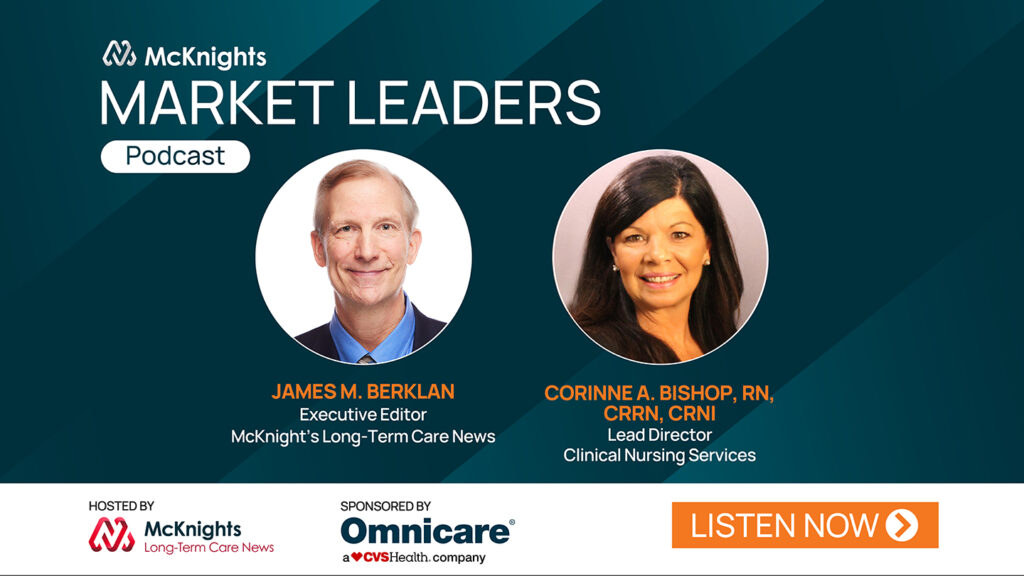
The new normal resulting from the coronavirus pandemic has presented a particular challenge to those afflicted with Alzheimer’s disease or dementia, as well as the dedicated healthcare professionals caring for them in skilled nursing facilities.
As Alzheimer’s Association mission partnerships director Doug Pace said in a March 30 news release, “Individuals living with dementia thrive best with a consistent routine and with person-centered approaches. During emergency situations, these practices are even more important.”
That is why the Alzheimer’s Association took the step that day of issuing COVID-19 guidelines for dementia caregivers, making clear the proper approaches to illness prevention, keeping residents connected with friends and family members, and monitoring and responding to various dementia-related behaviors.
Some 50 million people around the world are afflicted with Alzheimer’s disease or dementia, including 5 million in the United States, where these disorders are the sixth-leading cause of death. It is estimated that among nursing home residents, some 48% suffer from these diseases. Coupled with the COVID-19 pandemic, the result is “a surreal situation,” in the estimation of Marsel Mesulam, director of the Mesulam Center for Cognitive Neurology and Alzheimer’s Disease in Chicago. By that he meant that as much anxiety as others might feel amid this healthcare crisis, it is that much more pronounced for those dealing with neurodegenerative disorders.
“Providing guidance to help care and support people living with dementia during this challenging time,” he told Alzforum.org in late March, “is really beneficial.”
Central to this approach is person-centered care, which takes into account the values, preferences and needs of each individual. Such care focuses on the relationships the resident might have with others, and how that, as well as other environmental factors, might impact him or her. The manifestations of that in the current climate would be making sure that each patient’s paperwork — the HIPAA-compliant personal information form and advance directive — are up-to-date and easily accessible for all staffers.
The first of those documents has particular immediacy, as it allows day-to-day care to remain consistent in the event of staff changes or the introduction of temporary workers into the mix. It answers questions about how residents should be addressed, what their interests, routines and religious practices might be, who their family and friends are and what their abilities are. It’s also critical for staff to know each resident’s motor skills and ability to communicate: Do they need a wheelchair to get around? How much information can they process?
Of course, the extent to which patients can process information factors into their understanding of the importance of hand hygiene, social distancing and wearing a cloth face covering. The last of those matters can be particularly challenging; the Centers for Disease Control and Prevention advises that a mask should not be used if a patient has trouble breathing or struggles to remove it without help.
The CDC further recommends that while staying active is important, activities formerly held in a group setting should now be done individually in residents’ rooms or in small, socially distant groups at staggered times.
Again the question arises about disrupting long-held routines, and how difficult that can be for those suffering from Alzheimer’s disease or dementia. Beth A. Kallmyer, the Alzheimer Association’s vice president of care and support, advises that caregivers explain such changes in a fashion relatable to the resident, and not to over-explain if they are unable to grasp it.
Tom Meuser, director of the Center for Excellence in Aging & Health at the University of New England, agreed with Kallmyer’s first point, noting in a Healthline post that because memories fade in reverse, it is entirely possible that a patient with moderate dementia still recalls his or her early days. A healthcare professional can, as a result, tap into those memories to offer context. Meuser specifically mentioned that drawing parallels between our nation’s current straits and those the U.S. faced during World War II might resonate with those born in the 1930s.
“You still remember what it was like in WW2 from your childhood or parents talking about it,” he said, “so appealing to those memories of that time may be one way to frame the current crisis in a way the person can understand.”
Another potential issue is social isolation, which has been found to be comparable to smoking as a health risk for seniors. As the pandemic raged, nursing homes barred visitors while also restricting residents’ activities within their facilities, in an attempt to slow the spread of the virus among a particularly vulnerable age group. While in some cases one-on-one caregivers have been allowed to enter, that is not the general rule, putting the onus on staff, friends and family members to keep loved ones engaged.
Visits at residents’ windows have become commonplace, while many have turned to technology to help bridge the gap between seniors and their loved ones. But a Pew Research study showed that only 26 percent of those 65 and over feel confident using smartphones, computers and other electronic devices, a percentage that is almost certainly lower among those suffering from a neurodegenerative disorder.
It goes without saying that friends and family members have to make a more concerted effort than ever to reach out to seniors, whether by phone call, video call or window visit. There are also programs like AARP Mutual Aid, the Friendship Line and Senior Center Without Walls that avail seniors of opportunities to chat. In addition, a company called Papa offers a virtual companionship program, and Uniper has a telehealth and social engagement service.
And let us never forget that the healthcare professionals themselves — busy as they are, harried as they may be — can brighten a senior’s day like no one else. Even a brief conversation or an encouraging word or two can make a difference.
Finally there’s the question of what to do if a senior afflicted with Alzheimer’s or dementia contracts coronavirus. The CDC advises keeping them in their usual room, as moving them to a COVID-19 unit might cause disorientation or agitation. At the same time the CDC acknowledges that a move is often unavoidable, given the safety issues at hand. In that case it is best to familiarize the COVID team with the habits of the resident in question, while also moving familiar objects from the patient’s old room to his or her new one.
There are no easy answers in cases like these. Neurodegenerative disorders offer unique challenges, in and of themselves, and the coronavirus only makes things that much more complicated. It is incumbent upon healthcare professionals to acclimate residents to this new normal, to gently adjust routines and encourage new social outlets. Amid the complexities of the pandemic, it is up to all of us — healthcare providers, family and friends — to ensure those living with dementia are best positioned for continued health and safety.
Joel Landau is the founder and chairman of The Allure Group, a rapidly expanding provider of skilled nursing and rehabilitation services throughout the New York downstate area.




